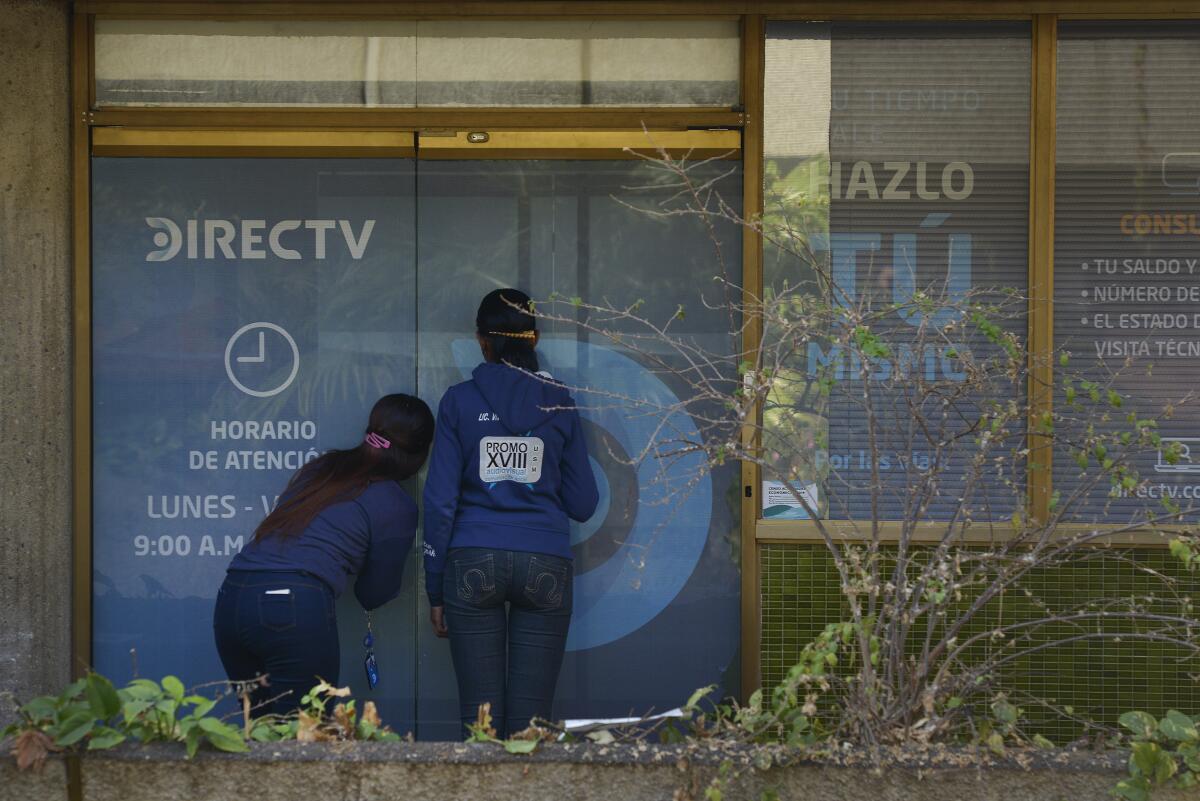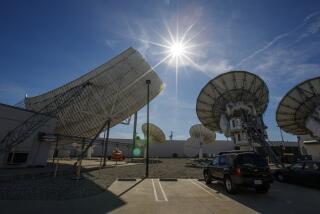The U.S. wants AT&T to stand up to Venezuela’s government censors

- Share via
MIAMI — In April, as a military uprising roiled Venezuela, Nicolás Maduro’s government ordered pay TV providers to immediately cease transmission of CNN and the BBC.
DirecTV, which is wholly owned by AT&T, quickly obliged, yanking the two networks off the air as live images of military trucks running over protesters were being broadcast to the world.
Now, pressure is building against the Dallas-based communications giant to stand up to Venezuela’s government censors.
In December, officials from the State Department met in Washington with executives from AT&T to urge them to help pull the plug on Maduro’s propaganda machine, according to five people familiar with the discussion.
The meeting followed months of outreach to AT&T by Venezuela’s opposition, according to the five individuals. Under a plan being promoted with the Trump administration, DirecTV, Venezuela’s largest pay TV operator, would restore to its lineup half a dozen international news channels that local regulators have banned in recent years, according to the five individuals.
The strategy harks back to a Cold War playbook of leveraging information to fight anti-U.S. propaganda and undermine authoritarian rule. But instead of covertly beaming U.S. government-produced content into foreign countries as Radio Free Europe did in Soviet bloc nations, this proposed effort consists of pressuring a private company to bring back access to private international news outlets that, until recently, Venezuelans took for granted.
AT&T faces a difficult choice: Comply with a Maduro government that the U.S. government no longer recognizes and has heavily sanctioned, or go along with the opposition’s plan and risk seizure of its installations and the loss of its license. According to corporate filings with the Securities and Exchange Commission, the company doesn’t need a physical presence in Venezuela to beam content into the country. It could use broadcast centers in Argentina, Brazil or California.
The U.S. officials and opposition operators are concerned that DirecTV is being used to broadcast state TV programming by Maduro to attack his opponents, who have no way to respond, according to the five individuals, who spoke on condition of anonymity because of the politically sensitive nature of the talks.
Of particular concern, they said, is the private network Globovision, which is carried by DirecTV. The channel has been sanctioned by the U.S. Treasury Department and is accused by the Venezuelan opposition of spreading disinformation. Globovision is a customer of Associated Press.
U.S. Secretary of State Michael R. Pompeo was briefed and expressed initial support for the plans to enroll DirecTV to help undermine Maduro, according to two individuals with knowledge of the discussions.
Planning is in the early stages, the two individuals said, and it’s just one of several options under consideration to pressure Maduro, the socialist leader who remains firmly in power in the face of U.S. sanctions aimed at propping up Juan Guaidó, the opposition leader recognized as Venezuela’s rightful leader by more than 50 nations.
The two individuals said no decision has yet been made on how much to lean on AT&T, which is strongly resisting any initiative that would jeopardize operations in a nation where it has a whopping 44% market share. DirecTV Latin America declined to comment.
The move to open up the airwaves would be significant because DirecTV reaches people who are dependent on the government, such as those in the working-class barrios, says David Smilde, from the Washington Office on Latin America. These groups don’t have other access to outside news, he says.
“This wouldn’t pose an immediate threat to Maduro, but it could complicate the longer-term ability of the government to control information,” said Smilde. “Maduro could conceivably try to confiscate DirecTV equipment from people’s homes, but this would be an extraordinarily unpopular move.”
A key to Maduro’s staying power are dozens of government-controlled newspapers, social media accounts and TV channels that have replaced the once highly confrontational private news outlets.
Further widening the information gap, the telecommunications regulator, Conatel, since 2017 has ordered pay TV platforms to eliminate 10 international news channels, accusing them of violating the Law on Social Responsibility on Radio and Television.
When Conatel banished CNN en Español, it accused the network of “direct aggressions that strike against the peace and democratic stability of the Venezuelan people.”
“The pay TV operators aren’t the ones giving the orders,” said Marianela Balbi, executive director of the Caracas-based Institute for Press and Society, “but they are accomplices in censorship.”
International channels broadcast by DirecTV had until recently filled a void left by Globovision, the last open-air network critical of the government, which was sold to a businessman linked to Maduro in 2013. Not long after the purchase, the channel softened its anti-government coverage. Globovision’s owner, Raúl Gorrín, has been indicted by federal prosecutors in Miami in connection with an alleged money laundering scheme involving Maduro’s stepsons. Gorrín did not respond to questions from the AP.
As government censorship has intensified, pressure has been building on DirecTV, the only broadcaster operated by a U.S. company subject to U.S. sanctions.
Last week, Venezuelan social media briefly lit up after Carlos Vecchio, the Guaido government’s envoy in Washington, said DirecTV would be “forced” by the U.S. sanctions to remove “treasonous” Globovision from its lineup.
But in Venezuela, DirecTV is required to carry several networks, including Globovision.
Experts said the U.S. government’s options for compelling DirecTV to do its bidding are limited. Media companies typically enjoy broad exemptions from sanctions because it is U.S. policy to promote the free flow of information worldwide.
Since Maduro took office in 2013, dozens of newspapers and radio stations have disappeared, leaving outlets that largely mimic the government’s line. Meanwhile, internet speeds are among the slowest in the world, and the government frequently blocks anti-government content.
But AT&T hasn’t made money in Venezuela for years, because of strict government controls that keep the price of its DirecTV packages artificially low — around 15 cents per month.
Nonetheless, as the cheapest form of entertainment in a nation ravaged by hyperinflation, its market share remains DirecTV’s largest in the world.
One idea being discussed to force its hand is for the opposition-controlled National Assembly to pass legislation ordering it to uphold the constitution, which guarantees access to “timely, truthful and impartial information, without censorship,” according to two of the people familiar with the project.
Guaidó last week said he would name his own ad hoc Conatel board to fight “the propaganda of a dictatorship that tries to distort reality.”
Some in the U.S. government, however, fear that pushing AT&T too hard could leave it to suspend operations in the country — an outcome nobody wants.
Other channels offer programming that promotes U.S. interests. Removing them could drive Venezuelans closer to the government.
Andres Izarra, a former Venezuelan communications minister, agrees that a woeful lack of diversity on television keeps Venezuelans in the dark.
But he’s skeptical that any plan to open up the airwaves would weaken Maduro.
“This seems to be a very desperate measure, since nothing else has worked,” said Izarra, who is now living in exile. “All it will do is allow Maduro to try and portray himself as a victim of U.S. aggression.”
More to Read
Sign up for Essential California
The most important California stories and recommendations in your inbox every morning.
You may occasionally receive promotional content from the Los Angeles Times.










